Kumasi Anglican Secondary School
Get to know about Anglican Senior High School in Ghana
| Anglican Senior High School | |
|---|---|
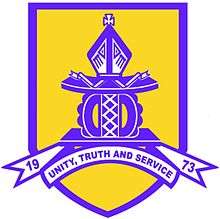 | |
| Address | |
P.O. Box KS 292 | |
| Information | |
| Type | Public – senior secondary |
| Motto | Unity, Truth and Service |
| Established | 1973 |
| School district | Kumasi Metropolitan |
| Chairman of Governors | Mr. D. M. Adusei[1] |
| Headmaster | Rev.Canon Senkyiri[2] |
| Staff | 120[3] |
| Enrollment | 2890[3] |
| Color(s) | gold purple white |
| Song | We will unite and work |
| Affiliation | Anglican Church |
| Alumni | Disciples |
The Anglican Senior High School is a co-educational secondary school founded in 1973. It is situated in Asem, a suburb of Kumasi in the Ashanti Region of Ghana. The present headmaster is Rev.Canon Senkyiri.
Crest
The school's crest is composed of four elements: a golden shield with purple outline; a purple and white bishop's mitre; a purple Akan male stool; and a white scroll bearing the motto of the school, "Unity, truth and service". The shield refers to the "shield of faith" in Ephesians 6:16. The shield is also a symbol of defence and security. The indigenous Akan male stool in the centre of the insignia represents the contribution of traditional authorities towards the establishment and growth of the school. These contributions include the provision of land, guidance, and encouragement. The Anglican bishop's mitre symbolizes the school's religious affiliation with the Anglican Church. The mitre sitting on the stool also represents peace, harmony, and unity between the Church and the society through education. The white scroll located on the lower half of the crest bears the school’s motto: "Unity, Truth and Service". Three colours are found in the school's crest: gold symbolizes honour and loyalty; purple symbolizes priesthood and kingship; white symbolizes purity and virtue.[4]
School administration
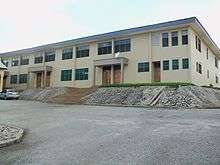
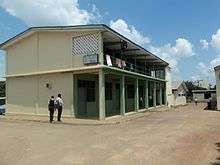
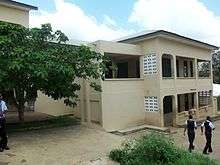
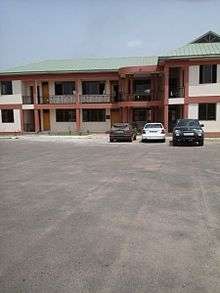
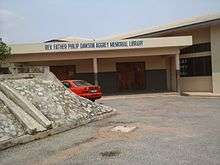
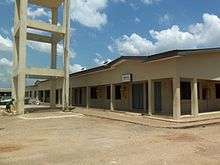
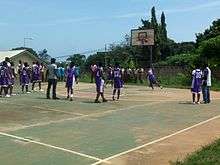
The school operates under the guidance of an advisory board of governors comprising individuals with professional expertise relevant to the management of the institution. Their objective is to ensure that the administration operates using the framework of the government's educational policy.
The headmaster, his assistants and the senior housemaster/housemistress are in charge of the day-to-day administration of the school, assisted by the house staff in charge of the boarding system. The school's financial officers include the Bursar), assistant accountants and accounts clerks. The headmaster is assisted by a teaching staff of 37, and a support staff of 36.[1]
History
In the early 1920s, the KASS site was acquired from the Amakom chief by the English Church Mission (E.C.M.) with the intention of establishing an institution to train clergy, and facilitate the growth of the church in the Gold Coast.[5]
Bishop M.S. O'Rocke (1913–23) secured the services of the monks of the Benedictine Order (O.S.B.) from Nashdom Abbey, England, to run the newly founded institution.[6] In 1952, St. Augustine's Theological College was established.[7] The college was closed after five years and the Catechist Training Programme, established in 1930, was also discontinued. The training of priests resumed between 1945 and 1950, when the programme was relocated to the Bishop's House in Accra. In the interim, the compound was used for retreats, as a guest house for the church visitors and social gatherings such as picnics. The Nigerian Anglicans worshipped in the chapel previously used for priests' training on Sundays.
In 1952, when thirty training colleges were established nationwide, the Anglican Church was asked to use the Kumasi facilities to run Wiawso Training College until the permanent buildings for the college were constructed at Wiawso in the Western Region. Mr. N.Y. Topp Yankah was appointed the first Principal from 1952 to 1956, followed by Mr. S. Blankson, from 1961 to 1964, when the buildings at Wiawso became ready to receive both students and the administrative staff. Wiawso Training College was then moved to Sefwi Wiawso. The buildings and the associated infrastructural facilities were left vacant.
To fill the vacuum in Kumasi, the Anglican Church applied to the Government for the Day Teacher Training College (which had already been set up at the Bishop's House and school compound in Accra) to be transferred to Kumasi. In September 1956, the college was opened in Kumasi under the principalship of E.O. Nortey, a former resident housemaster of Wiawso Training College, Kumasi campus. Ill-health prevented his remaining in post, though. Hence, in January 1967, Rev'd P.D. Aggrey BD (Lond), who had served as Chaplain and later vice principal of Adisadel College, Cape Coast, succeeded him.
The Nigerian Anglicans started a church at the present St. Augustine's basic school compound, at Akwatialine in Kumasi, in 1969. However, they had to abandon it as a result of the alien's compliance order, which forced all aliens out of the country.
In 1969, Anglican Day Teacher Training College under Fr. Aggrey started the St. Augustine's Primary School, Akwatialine, as a practice school for the training college.
In 1972 when the second Republic (under Prime Minister Dr. K. A. Busia) was overthrown by Colonel I. K. Acheampong, the new government decided that numerous training colleges would be converted into secondary schools or closed. Anglican Training College was listed as one of those to close. The staff, supported by their principal Fr Aggrey, signed a petition asking the government not to close the college, but to convert it into a secondary school to be called Anglican Secondary School, Kumasi. The petition which was sent via the bishop, Rt. Rev. J. B. Arthur, who in turn wrote a covering letter approving of the petition. Both letters were forwarded to the then secretary of Education, Colonel Nkegbe in Accra.[8] The petition was granted and in September 1973 Anglican Training College became Anglican Secondary School. It was a co-educational school but in 1987 stopped accepting girls as boarders. Fr P.D. Aggrey who was principal of the training college was retained as headmaster of the secondary school.[9] He administered the school from 1973 to 1981 when he retired and was succeeded by Mr. John Poku between 1981 and 1986. In 1987. Mr. A. E. Kyere (a.k.a. Kontonkyi) assumed duty as the third headmaster of the school. It was under him that the school improved academically. In 1999, the school was for the first time, invited to take part in the National Science and Maths Quiz Competitions. Rev'd Canon E.Y. Brobe-Mensah, assumed headship of the school in November 2003, remaining in post until 2010.[1]
Headmaster of Kumassi Anglican Secondary School[1]
| Name of Head | From | To |
|---|---|---|
| Rev'd Philip Dawson Aggrey | 1973 | 1981 |
| Mr. John Poku | 1981 | 1986 |
| Mr. Andrews Evans Kyere | 1987 | 2003 |
| Rev'd Canon Emmanuel Yaw Brobe-Mensah | 2003 | 2010 |
| Mr. Alex Conduah | 2010 | 2017 |
Campus
There are seven houses on campus;
| Aglionby | Quaque | |||||||
| A.E. Kyere, also known as Kontonkyi | Roseveare | |||||||
| Prempeh | Brobbe-Mensah | Conduah Girls |
The school also has an assembly hall, five classroom blocks, science laboratories, ICT laboratories, an art studio and a library. The campus includes a basketball court and a football field.
Curriculum
The school provides a broad curriculum, including English, mathematics and sciences (either as integrated science or as separate disciplines of biology, chemistry and physics). In addition, the general arts curriculum offers courses in Christian religious studies, economics, English literature, geography, government, history and music. Language teaching includes French and Twi (Asante). Other curriculum areas include art, business, home economics and ICT.[10]
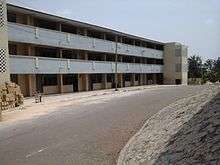
Extracurricular activities
The extracurricular activities programme at KASS offers a range of sports and games, clubs, societies, religious groups, entertainment and clean-up exercises. Clubs and societies include business club, Child's Right International club, debating club, general arts club, Ghana Red Cross society, ICT club, science club and writers' club. Although Anglican Senior High is an Anglican foundation, It has a singing group, Kass singers or KAS-SING, established in the 1997. It accepts pupils from a wide range of faiths, and religious groups within the school include National Union of Anglican Students (GNUAS), Catholic Students Union (CATHSU), Assemblies Of God Campus Ministry (AGCM), Pentecost Students and Associates(PENSA), Presby-Methodist Students Union (PMSU), Church Of Christ Students Union (COCSU), Ghana National Union of Adventist Students (GNAAS), Junior Baptist Students Union (JBSU), Deeper Life School Outreach (DLSO) and the Ghana Muslims Students Association (GMSA).
In 1999, the school began entering teams in the Ghana National Science and Maths Quiz, with varying degrees of success.[11] In their first competition, the school was knocked out in the first round by eventual runners up Wesley Girls' High School, but in 2007 KASS reached the final.[12]
Sports and games
Sports taught in PE lessons and as part of the extracurricular activities programme include athletics, basketball, handball, soccer, table tennis, tennis and volleyball. All sports are open separately to boys and girls throughout the school. The school regularly sends representatives to local, regional and national competitions.
Notable alumni
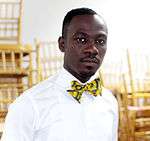
- Okyeame Kwame – musician[13]
- Lord Kenya – musician[14]
- Dominic Adiyiah – footballer
- Amos Frimpong – Kotoko Captain[15]
- Mr. Kwabena Kesse – CEO Kessben Group of Companies, an alumnus of the school[16]
- Noble Nketia – Gospel Musician[17]
- Prince Tuffour – Musician[18]
- Dr. Isaac Okyere – Heart Surgeon at the Komfo Anokye Teaching Hospital
- Alhaji Mubarak Mohammed Muntaka – Member of Parliament for Asawase
- Dr. Samuel Adu Amankwah – Researcher, University of Leeds[19]
- Dr. Philip Kofi Adom – Lecturer, UPSA - Ghana [20]
See also
- Education in Ghana
- List of senior high schools in Ashanti Region
References
- https://web.archive.org/web/20120907003149/http://kass.edu.gh// NB The school currently has no website; this is archived data from 2012.
- "KASS Head Voted Best Headmaster". Archived from the original on 4 May 2015. Retrieved 15 July 2015.
- "Locate a Person's Home Using Mobile Number Lookup".
- "Color Wheel Pro: Color Meaning". www.color-wheel-pro.com. Retrieved 31 May 2018.
- Sundkler, Bengt (2001). A History of the Church in Africa (2nd ed.). Cambridge: Cambridge University Press. p. 724. ISBN 0-521-58342 X.
- Sundkler, Bengt (2001). A History of the Church in Africa (2nd ed.). Cambridge: Cambridge University Press. p. 529. ISBN 0-521-58342 X.
- Pobee, John S. (2009). The Anglican Story in Ghana. Khanishie-Accra: Amanza. p. 150. ISBN 978-9988-0-3780-2.
- Pobee, John S. (2009). The Anglican Story in Ghana. Kaneshie-Accra: Amanza. p. 242. ISBN 978-9988-0-3780-2.
- G. McLean, Amissah (1980). Reminiscences of Adisadel. Ghana): Afram Publications. p. 79.
- "Anglican Senior High School > MEMBER | Ghana Schools Online". www.ghanaschoolsonline.com. Retrieved 31 May 2018.
- GNSMQ Results 2004.
- GNSMQ Results 2007
- "Okyeame Kwame Biography | Profile | Ghana". www.peacefmonline.com. Retrieved 4 September 2018.
- info@ghanabase.com, GhanaBase Music. "Biography of Lord Kenya | Ghana Music | Lord Kenya of Ghana". www.ghanabase.com. Retrieved 31 May 2018.
- "Amos Frimpong". www.facebook.com. Retrieved 4 September 2018.
- Barimah, Nana Yaw. "Kessben, daughter graduate together". Graphic Online. Retrieved 4 September 2018.
- info@ghanabase.com, GhanaBase Music. "Biography of Nobel Nketsiah | Ghana Music | Nobel Nketsiah of Ghana". www.ghanabase.com. Retrieved 4 September 2018.
- "Prince Tuffour". www.facebook.com. Retrieved 4 September 2018.
- "Samuel Adu-Amankwah". 4 September 2018.
- Asiedu, Janelle. "Philip Kofi Adom". www.upsa.edu.gh. Retrieved 4 September 2018.
External links
| Wikimedia Commons has media related to Anglican Secondary School, Kumasi. |